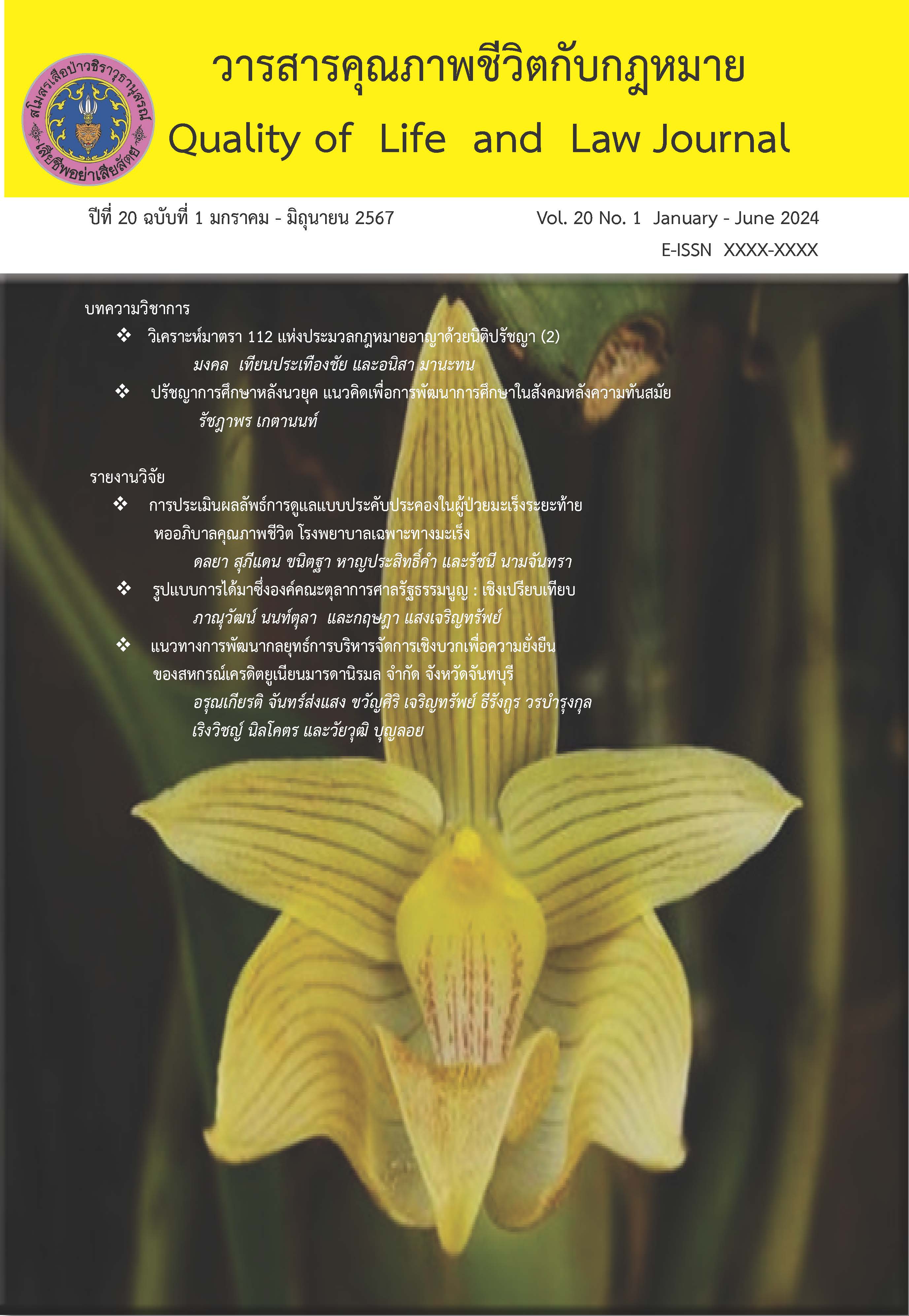Postmodern Education Philosophy Concepts for the Development of Education in a Post-modern Society
Main Article Content
Abstract
Education is one of the tools for human development, we use philosophy to lay the foundation or a guideline for education management which must be appropriate to the social context. Nowadays, our Thai society has entered a postmodern era. Therefore, the postmodern paradigm or idea would be different from before. From the idea of belief, there is only one truth, that causes people to cling to, which is not conducive to the development of society, especially the multicultural Thai society and people that are filled with diversity which can lead to conflicts of thought that lead to unrest in society. The postmodern paradigm should therefore change. Human beings should look at the world with understanding and accept diversity, reduce identity, reduce clinging, and educational philosophy that will help encourage humans to reduce self-confidence and alleviate conflicts that could lead to unrest. It is an educational philosophy that encourages belief in change. There is not only one knowledge of truth and the search for truthful knowledge occurs by using the senses in actual practice. Education in this era should focus on the matter of practice. Encourage learners to have the opportunity to learn by themselves. The appropriate educational philosophy in the postmodern era is Pragmatism, which is an educational philosophy that focuses on learners seeking knowledge by themselves through practice, experimentation, tangible, and self-proving. The knowledge gained is called experience. This kind of knowledge will be with you and is the knowledge that leads to accepting change and loosening your self-confidence.
Article Details

This work is licensed under a Creative Commons Attribution-NonCommercial-NoDerivatives 4.0 International License.
- บทความหรือข้อคิดเห็นใดๆ ในวารสารคุณภาพชีวิตกับกฎหมายเป็
- กองบรรณาธิการไม่สงวนสิทธิ์
References
กีรติ บุญเจือ. (2548). ปรัชญานวยุคของมนุษยชาติ ชุดปรัชญาและศาสนาเซนต์จอห์น. กรุงเทพ : มหาวิทยาลัยเซนต์จอห์น.
กีรติ บุญเจือ. (2545). ปรัชญาหลังนวยุค แนวคิดเพื่อการศึกษาแผนใหม่. กรุงเทพ : สำนักพิมพ์ดวงกมล.
เดือน คมดี. (2526). ปรัชญาตะวันตกสมัยใหม่. กรุงเทพ : สำนักพิมพ์โอเดียนร์สโตร์.
นาวิน พิชญาวิสุทธิกุล. (2561). ปรัชญาหลังนวยุค: อะไร อย่างไร และทำไม. https://phd.mbu.ac.th
ประทุม อังกูรโรหิต. (2551). ปรัชญาปฏิบัตินิยม: พื้นฐานปรัชญาการศึกษาในสังคมประชาธิปไตย. กรุงเทพ : โรงพิมพ์จุฬาลงกรณ์มหาวิทยาลัย.
พิสิฐธิกุล แก้วงาม. (2552). ทฤษฎีการเมืองกับการศึกษารัฐศาสตร์. หลักสูตรรัฐศาสตร์ วิทยาลัยนิติศาสตร์และการปกครอง มหาวิทยาลัยราชภัฏมหาสารคาม.
ภูมิกิติ. (2551). การตีความตามกระบวนทัศน์ 5. https://kit-meaninoflife.blogspot.com/2008/10/blog-post.html
ศุภร ศรีแสน. (2563). ปรัชญาทางการศึกษา. กรุงเทพ : คณะศึกษาศาสตร์, มหาวิทยาลัยราชภัฎบ้านสมเด็จเจ้าพระยา. https://lib.pnru.ac.th/cgi-bin/koha/opac
สุวิญ รักสัตย์. (2565). กระบวนทัศน์เศรษฐปรัชญาสุวรรณภูมิกับการพัฒนาคุณภาพชีวิต. https://philo.mbu.ac.th/
อเนก สุวรรณบัณฑิต. (2558). เอกสารประกอบการสอนวิชาปรัชญาศึกษา. บัณฑิตวิทยาลัย มหาวิทยาลัยราชภัฏสวนสุนันทา.
Bacon, Francis. (1995). Novum Organum Book 1 Chicago: The Great Books Foundation. Chicago.
Comte, August. (1974). Positive Philosophy. New York: AMS Press, Inc.
Gary, Aylesworth. (2004). Postmodernism, Stanford Encyclopedia of Philosophy. https://plato.stanford.edu/entries/postmodernism
Kant, Immanuel. (1804). Rutledge Encyclopedia of Philosophy. Stanford.
Lyotard, Jean-François. (1984). The Postmodern Condition: A Report on Knowledge. Minneapolis: The University of Minnesota Press.
Tansey, Stephen D. (2004). Politics: the basic. (3rd Edition) London: Routledge


